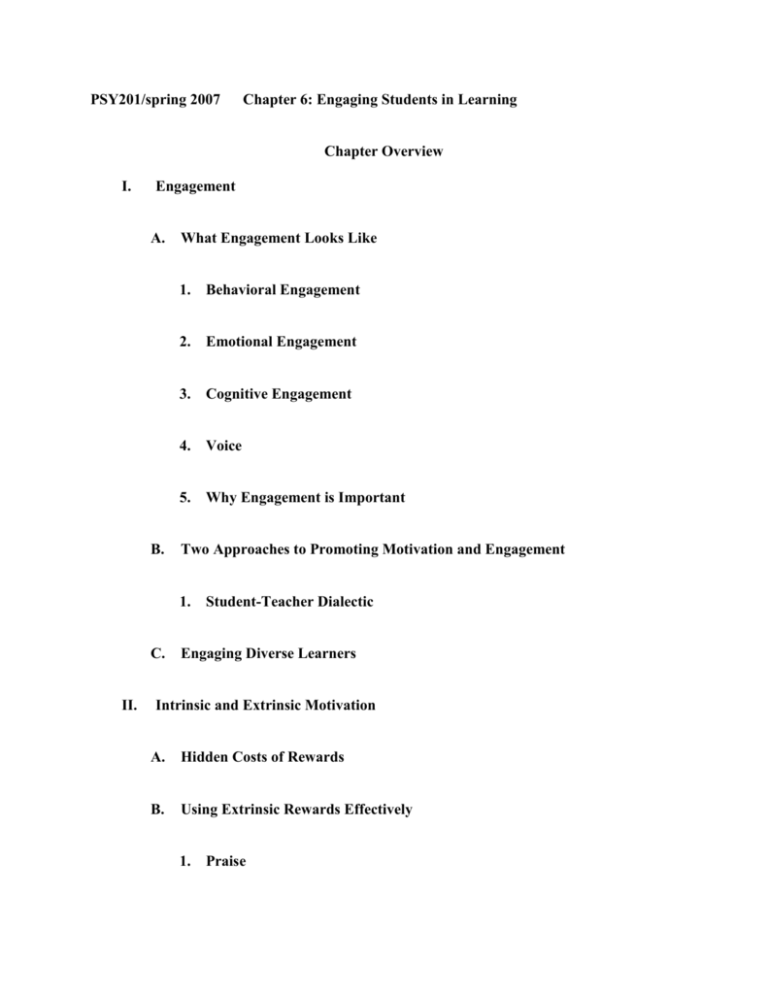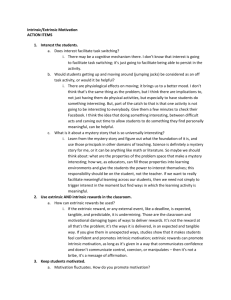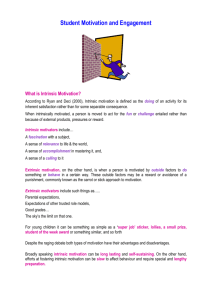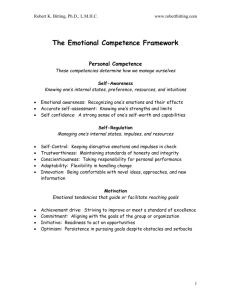PSY201fall2007chapte..
advertisement

PSY201/spring 2007 Chapter 6: Engaging Students in Learning Chapter Overview I. Engagement A. B. What Engagement Looks Like 1. Behavioral Engagement 2. Emotional Engagement 3. Cognitive Engagement 4. Voice 5. Why Engagement is Important Two Approaches to Promoting Motivation and Engagement 1. C. II. Student-Teacher Dialectic Engaging Diverse Learners Intrinsic and Extrinsic Motivation A. Hidden Costs of Rewards B. Using Extrinsic Rewards Effectively 1. Praise C. How to Motivate Students with Mental Retardation: Intrinsically or Extrinsically? D. Types of Extrinsic Motivation III. Psychological Needs A. B. C. Autonomy 1. How Teachers Support Autonomy 2. Why Supporting Autonomy is Important 3. Why Are Teachers So Often Controlling? Competence 1. The Pleasure of Optimal Competence 2. How Teachers Support Students' Competence 3. Flow Relatedness 1. D. Why Supporting Relatedness is so Important The Engagement Model 1. What Makes for a Good Day at School E. Motivating Students during Uninteresting Lessons 1. Increase Valuing 2. Increase Interest IV. Curiosity, Interest, and Positive Affect A. V. Sparking Curiosity 1. Guessing-and-Feedback 2. Suspense 3. Controversy B. Inducing Positive Affect C. Using Technology to Promote Engagement Calming Anxiety, Protecting Self-Worth, and Overcoming Fear of Failure Learning Objectives As a result of your experiences with this chapter, you should be able to answer these questions and meet the indicated competencies: What is engagement, and why is it important? o Expected Student Competencies: Define engagement; be able to distinguish among behavioral, emotional, and cognitive engagement; note the role of voice in engagement; detail the significance of engagement in the classroom What is the difference between intrinsic and extrinsic motivation? o Expected Student Competencies: Define intrinsic and extrinsic motivation; identify the sources of each; generate a list of common positive classroom reinforcers How can teachers support students’ psychological needs? o Expected Student Competencies: Define autonomy, competence, and relatedness; explain the significance of each How can teachers motivate students during uninteresting activities? o Expected Student Competencies: Develop techniques for enhancing students’ sense of autonomy, competence, and relatedness; understand the effective use of extrinsic motivation, and weigh the hidden costs of rewards in classroom activities; explain the value of using extrinsic rewards in informational ways In what ways can teachers spark students’ engagement? o Expected Student Competencies: Define curiosity, interest, and positive affect; describe the contributions of each toward engagement; outline approaches that teachers can use to enhance curiosity, interest, and positive affect In what ways can teachers calm students’ anxieties and fears? o Expected Student Competencies: Define anxiety, self-worth, and fear of failure; examine the mastery model program for approaches that reduce students’ anxiety, promote self-worth, and allay fear of failure How can teachers engage diverse learners and learners with special needs? o Expected Student Competencies: Relate how teachers can help balance the expectations of schools with the interests and perceptions of success held by diverse learners; balance the benefits and limitations of extrinsic motivators for students with special needs; examine the use of a dialectical approach to motivation for those students Key Terms anxiety autonomy autonomy-supportive environment autonomy-supportive motivating style behavioral engagement challenge-feedback sandwich cognitive engagement cognitive evaluation theory competence controlling motivating style controversy curiosity dialectical approach to motivation emotional engagement engagement extrinsic motivation failure tolerance flow guessing-and-feedback hidden cost of reward individual interest interest intrinsic motivation perceived locus of causality positive affect praise psychological need rationale relatedness self-handicapping self-worth situational interest suspense voice








